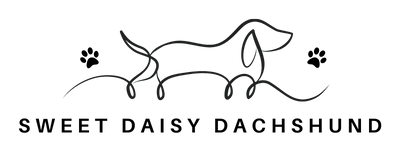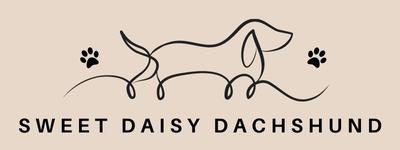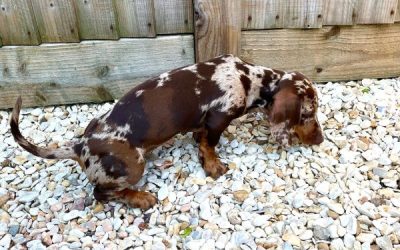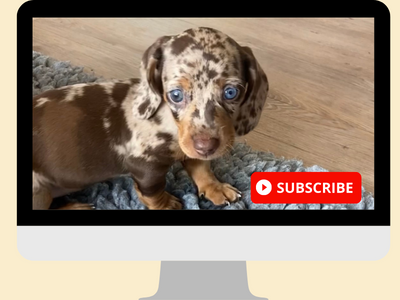If you have recently welcomed a new dachshund puppy into your home, you will be eager to find out what to expect over the coming weeks as they grow. The behavioural changes that occur when your puppy enters the juvenile development period can be somewhat challenging, so it’s important to be prepared. If you would like to get helpful tips on how to manage this behaviour and to learn how is our dachshund puppy’s behaviour changing at 15 to 16 weeks old, then keep on reading!


How Is Our Dachshund Puppy’s Behaviour Changing At 15 To 16 Weeks Old – Table Of Content:
- Our puppy is testing the boundaries and our patience
- Our dachshund puppy has found her voice
- Should we worry about separation anxiety?
- Yay…it’s holiday time!
- We have expanded our puppy’s diet
- It’s high time to start lead walking training
How Is Our Dachshund Puppy’s Behaviour Changing At 15 To 16 Weeks Old
Our puppy is testing the boundaries and our patience
Our puppy has now definitely entered the testing period of her development. She is testing the boudaries plus our patience, which can sometimes be somewhat stressful. Especially when she feels grumpy due to teething discomfort. She often breaks the house rules she knows she should obey and will often choose to ignore or challenge our behaviour training just to test the limits.
If you experience, actually we should say ‘once you experience’, this behaviour change, it’s very important to continue with your behaviour training. This phase is part of their natural development and may last several weeks. You must stay consistent with positive reinforcement approach and never punish your puppy for any unwanted behaviour.
Remember these 3 steps?
Step 1: Make your puppy aware you are not happy with their behaviour by using a strong but calm verbal cue ‘No’
Step 2: Distract your puppy by offering them a toy or a chew
Step 3: Praise and reward your puppy for playing with the toy or chew, which helps them understand this is the behaviour that is expected of them
Sooner or later, your puppy will learn to understand their place in the pecking order and will respect you and your rules.

Our dachshund puppy has found her voice
Just as we were beginning to think that Daisy was a very quiet puppy, she suddently found her voice! And she is loving the fact she has a new way to express her wishes and feelings. On one hand, this is very helpful because she is using her new found voice well to communicate with us. On the other hand, she has been reacting to different noises when in the garden and when guarding the house from the front window.
Luckily, our outings are a completely different story as she does not react or bark when outdoors or on trips at all. We have put lots of time and effort into socialising her since day one and this has definitely paid off! She is a very well behaved puppy when outside.
We see no harm in the occasional barking and would definitely not expect our puppy to be completely silent. But if your puppy’s barking gets out of control, then it can be managed with some positive reinforcement training. It can take some time as dachshunds are known to be quite vocal so consistency and patience is key to being successful with this training.

Our tips on how to manage your puppy’s barking:
- exercise your puppy both physically and mentally as dachshunds can often bark when bored
- socialise your puppy a lot
- ignore your puppy’s behaviour if you believe they are just seeking your attention
- if your puppy barks due to separation anxiety then address this issue as soon as you can
- make sure there are no underlying medical issues
- manage the barking with positive reinforcement – give your puppy no attention when they are barking, wait for them to stop and then use the verbal cue ‘Quiet’ while rewarding them with lots of praise and a treat
Should we worry about separation anxiety?
Daisy has started showing some signs of separation anxiety when a member of our family leaves the room or goes out. She whines, barks and howls to start with but then gives up after a couple of minutes. We don’t believe it’s a full blown separation anxiety as yet, however we do realise that it’s important to address this issue now before it’s too late.
So what are the signs of separation enxiety?
- going potty indoors when left alone
- whining, barking and howling
- destructive behaviour
- signs of stress before you or your family member leaves
- pacing by the door
- trembling
If you fear your puppy may have separation enxiety, it’s important to desensitise them slowly rather than ‘throwing them in at the deep end’. Being exposed to fearful situations such as staying alone for long periods of time, can worsen their anxiety and prolong the training process. We have started by training Daisy to spend some play time in her crate while we leave the room for a short while. We then praise her a lot and reward her with a treat upon our return. If you would like to learn how we get on with the training and to learn a few more tips, make sure to read our next diary entry.


Yay…it’s holiday time!
My husband and I both celebrate our birthdays at the beginning of summer and what better way to celebrate then by going on a short holiday! Daisy had been potty trained for over a month so we felt more comfortable about taking her to a pet friendly hotel. We must admit, we were a bit nervous about how well she would cope with the long car drive and how she would feel about spending the night in a strange place. But she was as good as gold and we all had a lovely time!
It was also very rewarding to see that our training and socialising has paid off and she behaved well, for example:
- coped really well with the long car journeys and slept most of the way (exposure training)
- she was able to potty on command when stopping for a break (potty training)
- interacted really well during social situations with both dogs and people (socialising training)
- slept well in her crate over night (crate training)
- asked for a potty break when needed to go out (potty training)
So if you are toying with the idea of taking your puppy on a holiday, then go for it! If you feel your puppy is ready for an adventure, then there is no need to hesitate. After all, this will be a good opportunity for you to introduce your puppy to new environments and situations as part of their socialising training.

We have expanded our puppy’s diet
When Daisy joined our family at 9 weeks old, we had a bit of a tough time feeding her. She didn’t show much interest in eating her kibble the first two weeks at all. If you read our diary entry How is our dachshund puppy doing at 10 weeks old, then you know that we switched Daisy to a raw diet at that time and she has thrived on it since then.
She loves eating her raw chicken with beef tripe. But we decided it was time to introduce her to new protein when she turned 15 weeks. Beef seemed the obvious option as she was already on beef tripe and was not showing any adverse reaction to it. However, she didn’t seem to enjoy it so we switched to lamb instead, which she absolutely loves. Eventually we will introduce her to 5 to 6 different proteins, which we will rotate to keep her on varied and nutritional diet.
Over the last few weeks, we have also gradually introduced Daisy to different treats. We were keen to expend her diet and to explore her likes and dislikes. We have offered her different types of fruit and veg as well as raw quail egg and peanut butter. It’s safe to say that she is a vegetable lover and is not so keen on fruit. She absolutely loves frozen peas, courgette and raw quail egg.

It’s high time to start lead walking training
Is your dachshund puppy pulling on their lead when you go for a walk? This is quite a normal behaviour for a young puppy that is excited to explore the World around them. And Daisy is no different! But it’s high time we started training her how to walk on the lead without pulling. And you may be quite suprised to hear that this is not as difficult as you may think.
The key is to show your puppy who the leader is and of course that’s you. 🙂 If your puppy is pulling on the lead and is positioned in front of you then they think they are the leader. So how do you change this? It’s actually quite simple. Every time your puppy starts pulling on the lead, turn around and start walking in the opposite direction. So this way, you suddenly start leading your puppy with them walking behind you or next to you, hence you are the leader!
You have to do this the very second your puppy starts pulling and just pull their lead slightly towards you. If your puppy is stubborn than just keep the tension on the lead for a few seconds and you will see your puppy will give up eventually and will come towards you.

Keep the training very exciting for your puppy so talk in a high pitch voice, use lots of praise and treats and just keep moving at all times. You need to keep your puppy engaged with you and ideally your puppy will keep looking at you most of the time. Basically make it an exciting game for them.
As soon as your puppy starts walking nicely by your side, release the tension on the lead and keep walking and rewarding your puppy. You can then decide to change the direction again even if your puppy is not pulling and in theory, your puppy should still follow you. Try walking there and back, walking in a circle or even running. This will make it even more exciting for your puppy.
How Is Our Dachshund Puppy’s Behaviour Changing At 15 To 16 Weeks Old – Watch Us On YouTube
If you would like to see what Daisy was up to in the last two weeks and how much she enjoyed her first ever holiday then make sure to watch our video below.
How Is Our Dachshund Puppy’s Behaviour Changing At 15 To 16 Weeks Old – Let Us Know What You Think!
If you have questions or need further advice on dachshund puppy’s development and behaviour at 15 to 16 weeks, comment below so other pet owners can benefit from your questions and experiences.
Join ‘Dachshund Buddies’ On Facebook!
Join our ‘Dachshund Buddies’ Facebook community dedicated to all things dachshund! It is a great way to connect with other dachshund owners and enthusiasts, who are always there to help each other. You will find plenty of interesting conversations and valuable tips, tricks and advice to help you care for your loving doxie.








0 Comments